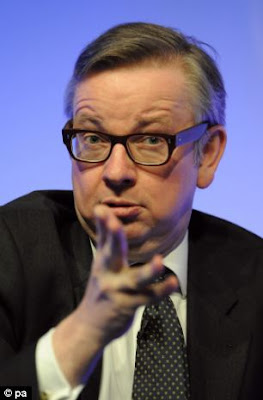It started off reasonably enough: “I think people in this
country have had enough of experts, enough of organisations with acronyms
saying they know what is best…” said Michael Gove last night. What he meant, of
course, is expert advice is at best an educated guess and many expert predictions
(or non-predictions) have proved false. The expert left wing economist David
Blanchflower forecast that 500,000 jobs would be lost if the Tories ever got
into power. And ‘experts’ have for many decades been warning of six days to
save the NHS.
Many experts are funded by groups in whose interests
they broadcast their advice or their visions of the future, yet rarely are they
brought to account for their errors or for their deliberately misleading
partisan announcements because their purpose has already been achieved; if you
can’t see the future you can at least attempt to shape it. Announce a
rise in the numbers with wheat allergies and you will see a rise in the numbers imagining they have wheat allergies. Keep telling everybody they will
be worse off and they will begin to feel worse off. Aside from obvious professional competence
in medicine, mechanics, science and the like, expertise is a slippery thing. Alchemists
were experts of a kind.
But Gove’s perfectly reasonable articulation of what an
enormous number of people feel but never get the chance to say to an audience was
deftly interrupted so that Faisal Islam could then repeatedly claim that he
said “We’ve had enough of experts.” And there was the headline. People who didn’t
watch the Sky News ‘town hall’ event – and quite a few columnists who did – now
believe that Michael Gove, the Lord Chancellor and Secretary of State for
justice, who relies all the time on being briefed by experts, has summarily dismissed
their views.
Oh, how do they lie to you? Let me count the ways... The
distortion of what interviewees are trying to say has become commonplace in our
relentless pursuit of making a drama out of a crisis, itself founded on
perfectly ordinary events. A misplaced pronoun, an ill-advised word and the
real message is lost, twisted into something far from that intended. Not long
ago Benedict Cumberbatch was pilloried for accidentally calling people ‘coloured’
instead of whatever approved term was then in favour – white people aren’t
fully briefed in this area. And when Diane James was trying to make a fair point
about a preference for employing English-speaking foreign workers in the health
service she was howled down by a mob just looking for an opportunity to
denounce her as a racist.
The electorate complain that there are insufficient
facts availabe to make a decision over the issue of British sovereignty versus
European Union supremacy. They are bombarded with soundbites which either speak
to their own prejudices or rattle their previous understanding. How much do we ‘send’
to Brussels each week? How many jobs ‘depend’ on membership of the EU? Who will
win and who will lose if we leave or if we stay? None of these questions are truly
accurately quantifiable and even if such accurate figures were available they
would be dressed up and gift-wrapped and PR’d and offered for sale under a
campaign which fundamentally ignored the unalloyed truth.
So, it all comes down to feel. Who do you like the look
of? Who sounds like he’s your friend and not like a sharp-suited salesman? Who
do you trust? Michael Gove’s argument was really about all of this; the lack of
trust in the political and big business elites; the sense of cards being
stacked against the ordinary worker (‘twas ever thus); the weight of oppressive
power represented by centralised, bullying, unelected government. By the way
Faisal Islam kept on interrupting and misquoting him, he was rather in danger
of appearing to be on the side of the bullies himself.
No gimmicks - over to you...
Whatever the truth of the matter the central question for
this referendum has little to do with facts and experts and televised debates
and battle buses and twenty-four hour media coverage. In or out, there will be
consequences for a relatively small number of people; for the majority little
will change. The question is, do you believe in an independent Britain,
governed democratically, where the government can be held to account by the
people? Or would you prefer to leave your fate and that of your children in the
hands of bureaucrats whose roles you can’t describe and whose names you’ve
never known?

Rarely held to account.
ReplyDeleteElections are the only time they may face retribution but they are never punished for their crimes against society.
I'd bring back hanging for them but I'm that sort of guy.